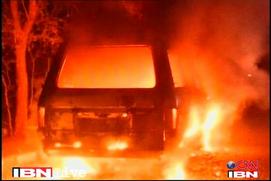
Hyderabad, April 16: A student of the Osmania university here was stabbed for supporting a beef festival organised by several student groups opposing "food fascism" in hostels, police said on Monday. The beef festival saw clashes, which saw five students being injured, and even led to vehicles being burnt.
The situation in the university was tense as violence continued in the campus past midnight with a group of students attacking the 'C' hostel and stabbing a student for supporting the beef festival. Police said the injured student was admitted to Gandhi Hospital here.
Protestors set afire a bus of state-owned Andhra Pradesh State Road Transport Corporation (APSRTC).
The clashes broke out Sunday night after some Dalit and left-wing student groups organised a beef festival on the campus, to highlight their demand for including beef in the hostel menu. Over 200 students and some professors attended the festival and ate various dishes made of beef.
Akhil Bharatiya Vidyarthi Parishad (ABVP) activists staged a protest against the festival and clashed with the organisers. The two groups attacked each other with stones and sticks. Five students were injured in the clashes. Two vehicles were also set afire.
Police used teargas shells and batons to disperse the clashing groups. The campus, which witnessed many violent protests over separate Telangana state during last two years, turned into a battlefield.
The beef festival was organised by Telangana Students Association, Progressive Democratic Student Union, Student Federation of India and student groups from English and Foreign Languages University.
The organisers claimed that beef is the part of their cultural identity and an affordable source of nutrition. They said the festival was to oppose 'food fascism' in university hostels.
Supporting the demand, P L Visweswara Rao, former professor of communication and journalism at the university, said students have a right to seek a particular food. He alleged that the police and the university administration failed to protect the students participating in the festival.
Th ABVP, which opposed the beef festival, called for university shutdown Monday.
Police have sealed all the routes leading to the university and deployed additional police and paramilitary forces on the campus to prevent further clashes.





Comments
Add new comment